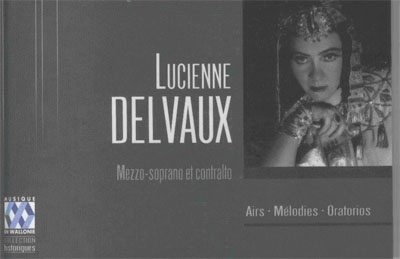
Lucienne Delvaux: airs, mélodies,oratorios
Musique en Wallonie CD MEW0739-40

How well I remember that performance of La Favorite at Ghent more than 30 years ago. I especially went to listen once more to France’s last ‘fort ténor’, Tony Poncet of the mighty roar and the often more subtle singing than he was given credit for. I especially remember that during the courtiers’ chorus the whole house lustily sang along “un-deux-trois”; according to a 100 year old Favorite tradition. Twenty years later at my next Favorite (actually Favorita- Fisichella, Baglione) I too joined the singing (and my wife who didn’t know the tradition thought for a moment I had gone mad). But this time there were only thirty or forty who went along. A few years later at De Munt (Baltsa, Cupido) and still later in Liège (once more a French cast; Uria-Monzon, Viala, Téziers) ushers would probably taken me in custody if I had sung as this amusing tradition had become completely obsolete. A pity.
Back to Ghent and the greatest surprise of the evening. I only vaguely knew the name of Lucienne Delvaux who sang Léonore as she had no commercial records. At her first utterances I remember how I bent forward on my seat to have a better look at the scene. Had Rita Gorr substituted for Delvaux without any notice at all ? No, on second looks the lady was more svelte than Gorr and the voice too was a bit different. Nevertheless this was clearly a case of “voce parallele”. The timbre was much the same; noble and personal. The volume was generous indeed and the style of singing and the pronunciation were authentically French as Delvaux (born 1916 in Liège) was singing in her mother tongue. The top notes sounded even more sure than Gorr’s as Delvaux, who had started 7 years earlier than the Flemish mezzo, had never ventured into the soprano repertoire and never sang in the really big barns like the Met or La Scala. Even after almost a quarter century into the career, the voice sounded remarkably fresh. I went away from that performance with a question Messrs. Cardol and Lemmers, the producers of this fine recording, pose themselves at the end of their interesting notes on the life and career of Delvaux. Why did this world class mezzo never made commercial records ? Did she and her husband (a Flemish vocal coach) prefer to stay at home most of the time ? Not probably as she sang all over France and its overseas departments. Was she not assertive enough ? Was she as a Walloon considered to be a foreigner with French recording firms ?
Anyway this was a missed opportunity and therefore this double CD (very stylishly produced) is more than welcome and will be quite a revelation to many a collector as Delvaux was one of the most underrated singers I ever heard. Luckily for us Dutch radio invited her several times and in Hilversum they always had more sense of history than at Flemish or Walloon radio where tapes of important concerts were mostly wiped. Therefore we can now listen to this unique voice in Carmen where her knowledge of the language and her forceful but never vulgar interpretation tells you how a real Carmen should sound. Her Dalilah too is the perfect seductress. Her husband taped an aria once broadcasted on Flemish radio and I still don’t get it why the Flemish producer asked her to sing the Italian version of Favorite instead of ‘Oh mon Fernand’ but a worthy souvenir of that Ghent performance it is. One small weak point in her vocal delivery is that she sometimes blasts a little at the very top as she pushes on the voice (remember these are all live performances, no hanky panky with splicing in top notes) like in O don fatale. But she always stays firm on the note and doesn’t go flat as Gorr did after 15 years of career. The Aida is sung in very clear French (with Huberte Vecray, another candidate for inclusion in these series) and a fine testimony of the strength and importance of Walloon singers who for so long dominated ‘l’école française de chant’ (and who regrettably declined as Wallonia itself went into decline).
The second CD of the set is mostly devoted to non-operatic music where Delvaux too is outstanding though in accordance with the times she employs the same splendid operatic voice in her interesting Nuits d’été and the far less interesting piece by Milhaud. One small complaint. The first CD with almost 80 minutes is generous indeed but the second one only lasts 55 minutes and it’s a pity Delvaux’s three arias from Werther and her Dido scene are not included as I know Mr. Cardol possesses them. Kept in stock for another CD ? Anyway, this is probably up to now the album in the worthy series “Musique en Wallonie” that will amaze anybody who has never heard of Delvaux. So grab it up while it is available.
Jan Neckers, Operanostalgia